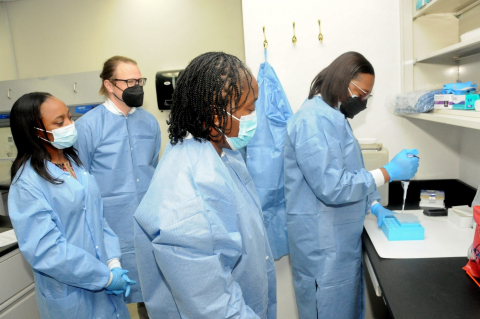
The University of the West Indies (The UWI) Mona Campus – working in close collaboration with the University Hospital of the West Indies (UHWI) and the Ministry of Health and Wellness (MOHW) - has established a Next Generation Sequencing (NGS) Service in the Department of Microbiology in Faculty of Medical Sciences.
The NGS service was established following the generous donation of a MiSeq Next Generation sequencer from Jamaica’s Ministry of Health & Wellness and funded by the CHASE Fund as part of the country’s national response to the COVID-19 pandemic.
Next generation sequencing is essential to the national COVID-19 response, helping to identify known variants circulating, as well as new variants that arise amid low vaccination rates. NGS also has wide applicability in biology and overall health, including answering fundamental questions in HIV/AIDS, in biodiversity, natural product research, vector management, pathogen surveillance, antibiotic resistance and healthcare-associated infections.
As a priority, the service is focused on determining circulating variants of the SARS-CoV-2 virus which causes COVID-19. In its first run, appropriate samples were selected from the National Public Health Laboratory, under the guidance of the National Surveillance Unit of the Ministry of Health & Wellness, and the first results revealed a preponderance of the Omicron variant in Jamaica.
From January 17 and 21, 2022, the UWI team was trained by Illumina—a US firm that develops, manufactures, and markets integrated systems for the analysis of genetic variation and biological function. Subsequently, the first SARS-CoV-2 variants were produced in Jamaica; a critical step in building the country’s capacity to assist in the identification of known variants of the SARS-CoV-2 virus, and assisting other countries in the region who may require such services.
Professor John Lindo, Head of the Microbiology Department at The UWI Mona Campus, said, “The service at the Campus now obviates the need for researchers to send samples overseas for sequencing at great expense and only after navigating a long and bureaucratic export process.”
Dr Joshua Anzinger, who led the UWI Team said he is “extremely thankful for all the funding bodies that made possible the introduction of next generation sequencing for the first time in Jamaica, and grateful for the outstanding technical work of the sequencing team at the UWI Mona’s Department of Microbiology.” He added, “We are now positioned to provide much more rapid COVID-19 variant results than having samples shipped and tested off island. Furthermore, the acquisition of the MiSeq sequencer and other required sequencing equipment allows not only for this cutting edge technology that can characterize existing pathogens but can also be used to identify unknown pathogens. Having a next generation sequencing laboratory in Jamaica is a major step forward for the country.”
The commencement of this project sees The UWI, Mona joining its sister campus, St Augustine which was initially the only facility providing whole genome sequencing of viruses to the CARICOM region. Similar to the arrangement in Jamaica, The UWI St Augustine Campus also does SARS-CoV-2 sequencing for Trinidad and Tobago, on behalf of its Ministry of Health, as well as for other countries on behalf of CARPHA.
Pro Vice-Chancellor and Principal of The UWI Mona Campus, Professor Dale Webber welcomed the service and acknowledged the partnership that made it possible. He remarked, “The collaboration among The UWI, the University Hospital of the West Indies (UHWI) and the Ministry of Health and Wellness which led to the successful roll out of NGS at Mona speaks to our commitment to use our human and other resources in responding to the pandemic.”

